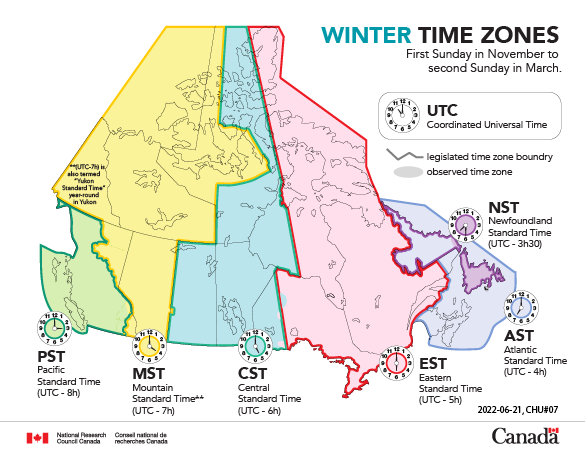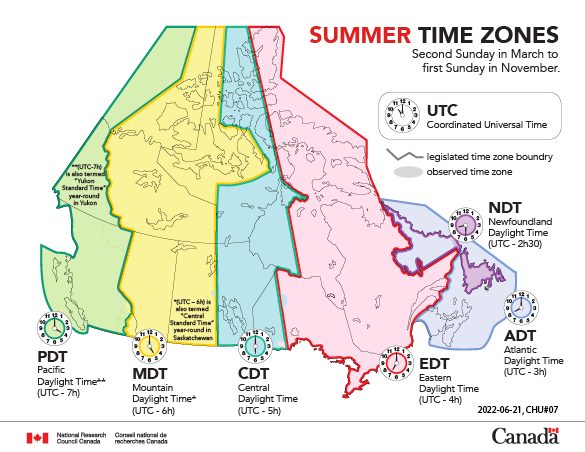Canada is the 2nd largest country and is quite wide.
There are six time zones in the country.
Additionally, some provinces/territories also observe daylight savings time.

The Six Time Zones of Canada from West to East (this is the time between Nov-Mar)
- Pacific Standard Time or PST (UTC-8:00 to UTC-7:00): This time zone includes British Columbia, most of Yukon, and a small portion of western Alberta.
- Mountain Standard Time or MST (UTC-7:00 to UTC-6:00): This zone covers the majority of Alberta, some areas in eastern British Columbia, western Saskatchewan, and a small part of western Nunavut.
- Central Standard Time or CST (UTC-6:00 to UTC-5:00): This zone includes most of Saskatchewan, a large portion of Manitoba, and a small area in western Ontario.
- Eastern Standard Time or EST (UTC-5:00 to UTC-4:00): This zone encompasses Ontario, Quebec, and Nunavut’s eastern region.
- Atlantic Standard Time or AST (UTC-4:00 to UTC-3:00): This zone covers the Atlantic provinces of New Brunswick, Nova Scotia, Prince Edward Island, and parts of Labrador.
- Newfoundland Standard Time or NST (UTC-3:30 to UTC-2:30): This zone is specific to the province of Newfoundland and Labrador, which has a unique time offset that is 30 minutes ahead of the Atlantic Time Zone.
Example:
In Toronto: 12 pm
In PST: 9 am
In MST: 10 am
In CST: 11 am
In AST: 1 pm
In NST: 1.30 pm

Summer Time (Daylight Saving Time):
Summer time, also known as daylight saving time (DST), is a seasonal practice observed in many regions of Canada and around the world. It involves advancing the clocks by one hour to make better use of natural daylight during the longer days of summer.
In Canada, summer time typically starts on the second Sunday in March when the clocks are moved forward by one hour. This change results in longer daylight in the evenings. Summer time ends on the first Sunday in November, when the clocks are moved back by one hour, reverting to standard time.
However, it is important to note that not all provinces and territories in Canada observe summer time. Currently, the provinces of Saskatchewan, most of which falls under the Central Time Zone, and some regions of British Columbia, including parts of the Peace River Regional District and the Creston Valley, do not participate in the practice of changing their clocks for summer time.
